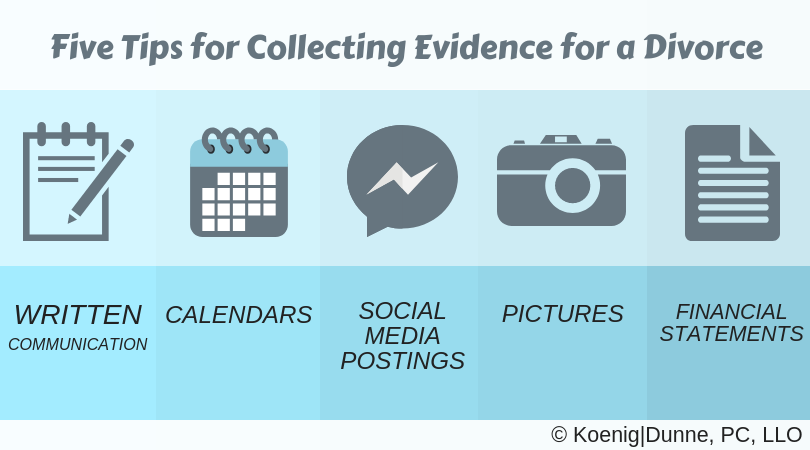Divorce trials and other court hearings often hinge on which spouse can provide the best evidence to the court to support his or her arguments.
- Which spouse has been his or her child’s primary caregiver?
- How much income has a spouse earned over the past year?
- Did a spouse acquire a disputed piece of property before marriage?
When courts must decide these types of issues, courts must rely on the evidence they are presented by the parties.
Here are five tips for improving the evidence for your case:
- Written Communication
If something important must be said between you and your spouse during divorce, make sure that it is preserved in writing. Text messages and emails between spouses are vital pieces of evidence and are often used during divorce trials, especially when children are at issue. Even if your spouse is unwilling to communicate with you in writing, preserve your one-way attempts at written communication with your spouse.
- Calendars
Dates and the timing of events are often disputed at trial. If you and your spouse kept a family calendar prior to filing for divorce, make sure that it is preserved. If not, start calendaring daily events and other important exchanges with your spouse as soon as possible during divorce. While calendaring, be sure to note any missed parenting time by your spouse, any work trips taken by your spouse, or any children’s appointments or activities that you have facilitated.
- Social Media Postings
Spouses often post inadvertently harmful information on social media sites. Ensure that if you are in the process of divorce, that you carefully consider the information that you post on social media, and ask your friends who “tag” you in posts to do so, as well. Furthermore, preserve your spouse’s social media posts by either printing dated screen shots of their accounts or by downloading their posts (if the site allows).
- Pictures
A picture is worth a thousand words. Take photographs (and date them) to catalog the property in your home or to evidence any physical harm committed against you by your spouse.
- Financial Statements
Bank statements, tax returns, W-2’s, paystubs, retirement account statements, and credit card statements—all of these documents are freely exchanged between spouses during marriage, but they can become problematic or expensive to obtain from your spouse during divorce. If you have access to these marital documents, preserve them in a safe place.
Your legal team at Koenig|Dunne has decades of experience in gathering and preserving evidence for divorce, and we are here to guide you through the evidence-collecting process.

